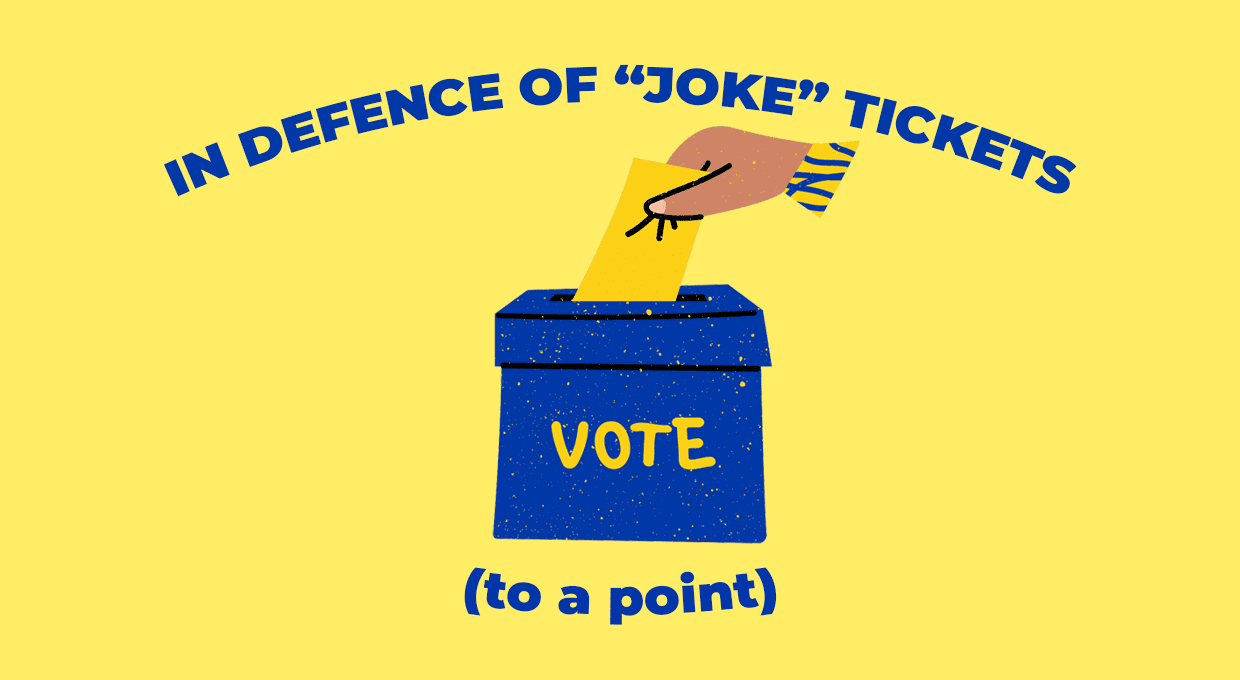Amidst the bright-coloured shirts and Eastern Avenue spruikers, student politics can seem overwhelming. Unsurprisingly, to the layperson, politics can come off as a bit, well, political. However, in the seriousness of it all, “joke” candidates stand out as a breath of fresh air and a reminder to voters of the serious issues that mainstream candidates advocate for.
By far the greatest benefit of “joke” candidates is that they’re refreshing. After all the speeches and the rhetoric of sincere candidates, to have a “joke” candidate get up and be shot with a Nerf dart is a joyous change of pace. The great refreshment value of “joke” candidates is that they can offer a lighthearted package that depicts the importance of student politics to a wider audience.
A student election is a public process that relies largely on campaigning and popularity. Often, “joke” tickets draw the most attention. This notoriety is often written off as attention-seeking. That is an undue simplification. Yes, “joke” candidates seek attention, but the same is true of all candidates in any election. When voters see “joke” candidates, they see not only the candidate themselves but the democratic process writ large seeking their attention and engagement. “Joke” candidates raise public awareness of the whole electoral process, and that deserves acknowledgement. The personality, prominence and humour of a “joke” candidate can draw public attention to the issues addressed by serious candidates. Not only that, but “joke” candidates can in fact be perfectly serious, only with the appearance of irreverence or amusement. For example, Joe Fidler’s 2021 USU Board run saw him take an anti-fracking policy that criticised greenwashing and material exploitation of nature through the character of a Barefoot-Investor toting businessman complete with a sidekick he described as “my campaign patron, an oil baron from Alabama.” Beneath the calls of “frack the Quad,” there was a candidate with a serious political message.
In essence, “joke” candidates raise the profile of the entire electoral process. They allow people to realise that there are many candidates who hold sincere positions, and make the process interesting for students. Since voting in student elections is voluntary, publicising the process is essential. With publicity comes engagement, and there is nothing more essential to the success of student elections — and the broader preservation of campus democracy — than engagement.
It would be foolish, however, to celebrate “joke” candidates without qualification. Some “joke” candidates seek nothing more than to make a mockery of the electoral process, and to turn student politics into a circus where they are the animals. In the course of writing this article, I came to the conclusion that I can only support a “joke” candidate that’s not too much of a joke. Yes, that sounds oxymoronic, but hear me out.
A good “joke” candidate should be able to find the balance between their comedic edge and sincere policy. If one considers that “joke” candidates have had a reputation for being devoid of policies, of being clowns that seek nothing but attention and a cheap laugh, the need for candidates that are funny yet meaningful becomes even more pressing. Politics, even student politics, is a fundamentally serious process. It should be seen as a fun business, not populated by politically dense types who run humourless and grey campaigns, but a business not trivialised to such an extent that it becomes a laughing stock where the farce outweighs the responsibility. Considering that USU Board Directors earn a $5,000 p.a. stipend, having candidates that run only to make a joke out of themselves and mock the whole system is distasteful and insulting.
With the upcoming SRC elections, there will be another gaggle of “joke” candidates running around. If you weren’t going to vote, check one out. They might pique your interest in politics or dredge up a laugh. Who knows, they might just convince you to vote for someone serious!





